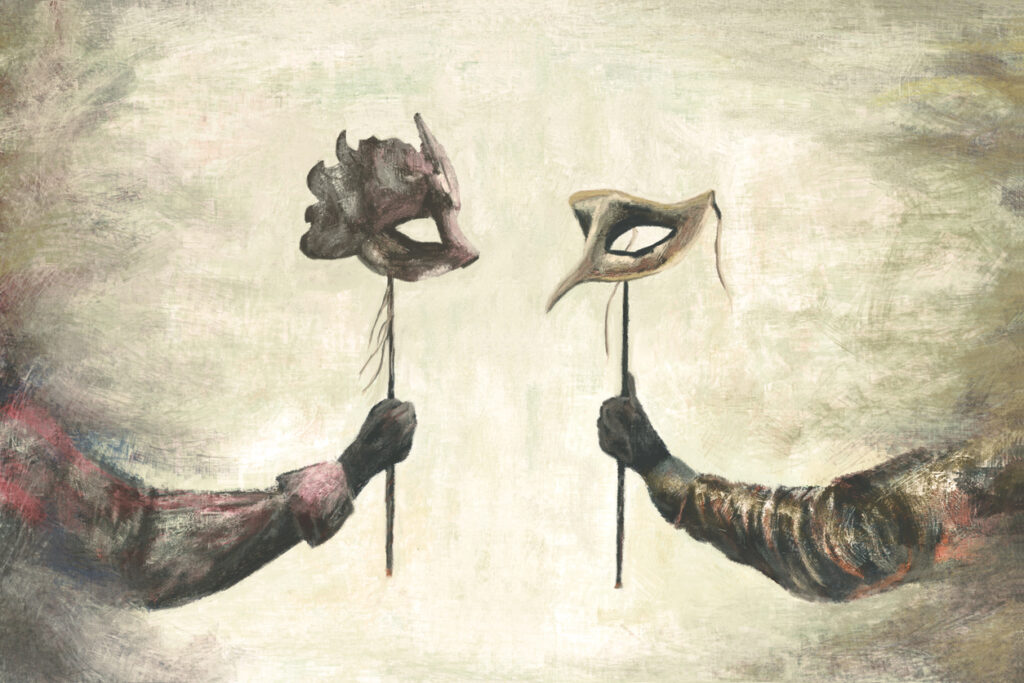“The faces are for no one. You are still someone. And to someone, the faces are as good as poison”.
This quote from Game of Thrones is a good analogy for the lack of congruence we can display in our own lives through the separation of professional and personal personas.
When we are in the workplace we learn to walk the walk and talk the talk in line with our organisational values and expectations. We proudly wear the mask or face that communicates acceptance and tolerance of all people, regardless of their ethnicity and racial background.
The question is: how many of us keep these masks/faces on when we go home? For some, there’s no difference between the mask they wear at work and the mask they wear at home. But for many there is.
One aligned face
Recent reports have shown that no one is immune to the racism virus, even the most prestigious professions including those entrusted to uphold the legal system in the UK. One report showed the extent of police misconduct in the UK Metropolitan Police Force.
This suggests that we are all capable of discrimination and racism towards those who are racially different from us.
The Six Stages Framework for personal growth and deeper development of conscience awareness is a tool for both personal and organisational development. Stage six of the Framework offers the opportunity for you to embrace leadership, and a higher and deeper understanding of self, with the goal of only having ‘one aligned face’ that is comfortable with moving beyond bias and discrimination.
For some there’s no difference between the mask they wear at work and the mask they wear at home. But for many there is.
Living in the modern world can be challenging. The constant need to align our values with the workplace and get on with everyone regardless of differences can be difficult. For some, this can equate to the need to tolerate those around us even though we would not choose to do so in our personal space. For some this masking can be truly exhausting and they look for places and ways to be their true selves.
While we live in a world where diversity and tolerance are increasingly promoted, some people can silently push back against this. At work, we learn to align our personal values with the workplace. It means that some are forced to hide what they really believe and think behind ‘masks of tolerance’ in the workplace.
How can we tell when individuals genuinely align with their organisation’s values or whether they are simply emulating the behaviours their workplace expects of them? Indeed, how can we tell when organisational values truly reflect the behaviours of those working in, and those leading, the organisation?
Aligning values
Dr M’gadzah recently worked with an organisation where it was clear that the values were out of alignment with the behaviours of senior leaders.
The description in the vision, mission and value statements didn’t match the organisation and employees from diverse backgrounds working within the organisation as felt unsafe and unable to talk about their experiences of discrimination.
This organisation wore its mask of acceptance and tolerance well but hiding behind this were faces of deception and lies. Many of the employees could see the misalignment between the espoused organisational values and the true values of the organisation. This misalignment, while cleverly hidden behind the organisation’s mask, was clearly visible and reflected in its culture and practices.
The truth is that masks only hide our physical faces to those around us. They cannot hide how others experience us and the resulting culture or experiences of those working within the walls of the organisation. Furthermore, they cannot hide the outcomes the organisation achieves or how its experienced by its service users and stakeholder.
Creating an inclusive working culture
We invite HR leaders and others to consider what lies beneath their personal mask and how that is creating an inclusive working culture in their organisation.
What face do you have on when you’re in the workplace? What face do you have on when you leave? Do we really have different masks for different situations? Is it a case of aligning our values to match the situation we are in but reverting back to our personal values and adorning our personal masks when we leave that situation?
It is time to reflect on the actions you can take to confront your bias and gain a deeper appreciation of yourself and your potential to be a change-maker in fighting all forms of discrimination in the workplace.
If you would like to get in touch with Dr. M’gadzah to find out more about how to implement the Six Stages Framework, or Ekua Cant to discuss neurodiversity training for managers please connect with us on LinkedIn.
If you enjoyed this, read: How to align recruitment with company values
[cm_form form_id=’cm_65a14c3f5da64′]







